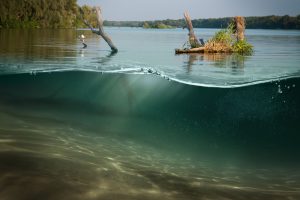A new funding program from the Alabama Water Institute is available. The AWI Pilot Bridge program supports faculty engaged in water research who are submitting external federal grants and would benefit from institute support in order to resubmit their proposal submissions. The deadline to apply is February 28, and application guidelines are available on the AWI website.
Since the program’s inception, AWI has approved and funded two projects.
The first, “Development of Genomic Resources to Expand Freshwater Mussel Research,” is from the Department of Biological Sciences. Funding support for this project will end within the next few months, but the National Science Foundation has expressed a strong interest in it. While awaiting proposal approval and funding from the NSF, AWI awarded a grant for its continuance.
The grant covers the sequencing costs needed to generate transcriptomic and genomic sequences for four proposed model organisms. According to the proposal, mussels are “keystone species in freshwater ecosystems, serving as nutrient cyclers, habitat modifiers and natural water filters.” However, they are vulnerable to climate change and habitat disturbance. The research from UA’s biological sciences department will help scientists better understand and develop predictive models to identify characteristics or traits that make some mussel species more susceptible to those vulnerabilities. If the best species for dealing with them are identified, researchers can help policymakers make the optimal financial decisions for conservation and restoration efforts to benefit freshwater ecosystems. The lead PI on this project is Matthew Jenny, and the co-PIs are Jeffrey Lozier and Carla Atkinson.
The second project, “Probing the Interactions of Titanium Suboxide Nanomaterials with Waterborne Pathogens,” was awarded a grant to Ruigang Wang in the Department of Metallurgical and Materials Engineering. These funds will support lab supplies, travel to research sites and a graduate student for six months to work on biological and environmental aspects of combating biological pathogens in water supplies as they are becoming increasingly resistant to commercial disinfectants.
According to the proposal, Wang’s group has developed defect-laden titanium dioxide nanotubes, which have shown to be effective at physically destroying bacteria. These nanotubes can be modified for different pathogen types, concentrations and water chemistry. Wang is currently seeking funding from the NSF and the National Institutes of Health.
For more information about how to apply for the program and for deadlines, contact AWI Research Administrator Stefanie O’Neill at soneill2@ua.edu.

